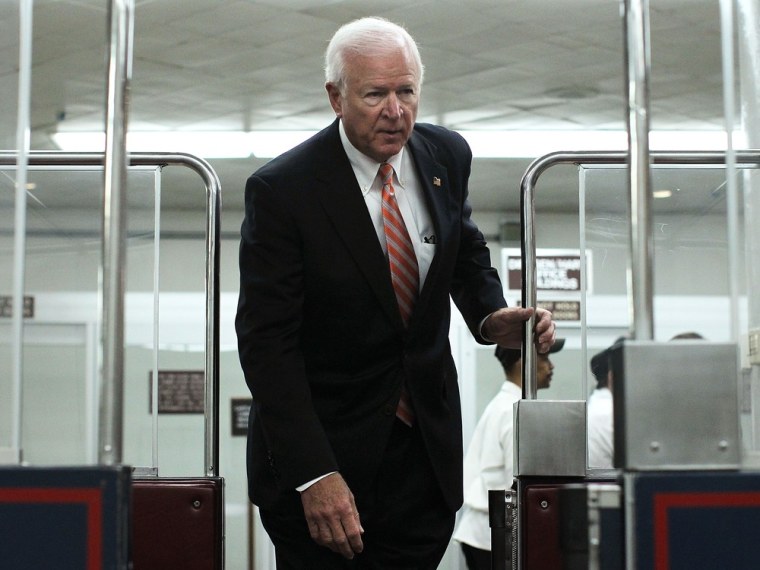Some Republicans appear to be softening what was once a hard stance on their no-taxes pledge as the end-of-the-year deadline on the so-called “fiscal cliff” approaches.
But it’s not clear how far they would go – if they would raise rates on the wealthiest, as President Obama wants, or if they are simply willing to go along with eliminating some loopholes and deductions to raise revenue. And those who have been outspoken on the topic thus far are not seen as the key players in the ongoing negotiations.

“I care more about my country than I do about a 20-year-old pledge,” Sen. Saxby Chambliss of Georgia told a local TV station from his home state. “If we do it his way then we’ll continue in debt, and I just have a disagreement with him about that.”
Chambliss is one of several congressional Republicans who have indicated they might break with an anti-tax pledge pushed by activist Grover Norquist.
On the Sunday shows and Monday morning TV, Sens. Lindsey Graham (R-SC) and Bob Corker (R-TN), as well as Reps. Eric Cantor (R-VA) -- the House minority leader -- and Peter King (R-NY), joined Chambliss in downplaying the “Taxpayer Protection Pledge.” Norquist’s 58-word pledge has been a mainstay in Republican politics since 1986. In 2011, every GOP presidential hopeful, including Mitt Romney (and excluding Jon Huntsman) signed it.
“I agree with Grover — we shouldn’t raise rates,” Graham said on ABC, “but I think Grover is wrong when it comes to we can’t cap deductions and buy down debt.” Graham added, “I will violate the pledge, long story short, for the good of the country, only if Democrats will do entitlement reform.”
Corker told CBS on Monday: “I’m not obligated on the pledge. I made Tennesseans aware, I was just elected, the only thing I’m honoring is the oath I take when I serve, when I’m sworn in this January.”
King, of New York, said on Meet the Press Sunday: “I agree entirely with Saxby Chambliss -- a pledge you signed 20 years ago, 18 years ago, is for that Congress... I think everything should be on the table.”
Norquist, in fact, says the fact that no House Republican has voted for a tax increase in 22 years is directly a product of his pledge. Norquist does not just mandate that lawmakers not vote for tax increases, but also that any bill they sign onto has to be “revenue neutral.”
In other words, cutting deductions and loopholes, for example, would also be out if not offset by further tax cuts. But Republicans and Democrats face an end-of-the-year deadline to try and figure out a way to avert the steep military and domestic spending cuts and taxes going up for everyone when the Bush tax cuts expire at the end of the year.
That some senators appear ready to talk revenue is not as significant as what House members say. It is widely believed that a deal would be struck between the White House and the House GOP, not with the Senate.
House Speaker John Boehner has said that “revenue” is on the table, but the president wants to raise rates for the wealthiest. Obama campaigned on the idea, but it’s not at all clear whether the House Republican rank-and-file would sign on to any rate increase.
Cantor, who wields some influence with the GOP conference’s more conservative members, is seen as more of a keystone, and he, too, seemed willing to go along with at least some revenue increases.
“There has been a lot said about this pledge,” Cantor said on MSNBC’s Morning Joe Monday. “When I go to the constituents, it’s not about that pledge. It’s about trying to solve problems. House Speaker John Boehner went to the White House and said, ‘Hey, Republicans in the House are willing to put revenues on the table.’ That’s a big move.”
“We were elected to fix problems,” Cantor said, before adding, “Even if you raise all those taxes, it doesn’t fix your problem.”
In a follow-up interview, Cantor’s office stressed that he remains against raising tax rates.
“Republicans aren't against tax rate hikes because of any one man or pledge,” spokeswoman Megan Whittemore said. “We are against hiking rates, because they're bad for the economy and hurt jobs. We've put ideas on the table that bring more money in while keeping tax rates where they are to produce job growth. It's now time for President Obama to put his ideas on the table for spending cuts and entitlement reform if he truly embraces a balanced approach.”
For his part, Norquist isn’t backing down. In a statement to NBC News, he took shots at the GOP senators and expressed confidence that no one would violate the pledge.
"Chambliss has been pushing this line since he joined the Gang of Six,” Norquist said. “Lindsey Graham has for two years said he would raise taxes if he got a 10:1 ratio of spending cuts through entitlement reform that could not be undone. There is no news in these two 'changing.'”
And he added, “They have not voted for a tax hike. They have had impure thoughts on present. Their impure thoughts did not change a single GOP vote in the 2011 fight over the debt ceiling which had a real deadline looming. One might have argued that the pledge died in 1990 when a sitting president and many in House leadership broke the pledge. However, the opposite happened, the pledge became more powerful when breaking it was seen to have very real consequence in 1992. After the 1994 election a majority of the House and Senate had signed the pledge."